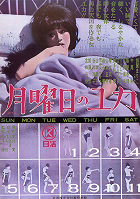Tartalmak(1)
Yuka (Mariko Kaga) lived in town where the boundary between social respectability and illegal activity was blurred. She lived the nightlife: drinking and dancing the nights away, attending to foreign customers who were looking for a "good time". Having sex with strangers didn't bother her, but being unable to satisfy her “papa” sugar daddy, tormented her - she was willing to do just about anything for papa. (Nikkatsu)
(több)Recenziók (1)
The myth created and told by men, which is repeated here in commentary with the stub that “so many directors with such a strong sense of the female soul come from patriarchal Japan” is a paradox that Only on Mondays mirrors with surprising expressiveness. Shaped as it was by men, Japanese culture reinforced the ideals and values of women, which were unsurprisingly supposed to revolve around servile submission to men. As such, most of the great “women’s” films by classic directors show women as beings defined exclusively by their relationships to men or rather by their subservience to them. In the best case, we can still defend this today as an appropriate portrayal of Japanese society at that time and the successful programming of the Stepford Wives there. Into this context come director Kô Nakahira and screenwriter (and future new-wave director) Koichi Saitó with seemingly another film that pretends to understand women. It would be very easy to brush off Only on Mondays, with its female protagonist who seems alarmingly dumb from today's perspective, as a portent of the Nikkatsu studio’s future series of films involving the lascivious exploitation of women. Upon closer inspection, however, the film proves to be a less sentimental, new-wave paraphrase of Breakfast at Tiffany’s, as well as a reflection of the absurdity of the gender roles that women play for men. The central protagonist, an 18-year-old call girl named Yuka, declares that she wants more than anything to make men happy. This code that pervades her entire being proves to be systematically instilled in her by various characters, led by her own mother, who is a veteran of the same profession. Furthermore, Yuka finds out in the course of the narrative that fulfilling men’s desires is an impossible task. Everyone expects something different from her or rather projects a different ideal onto her, but Yuka herself does not understand that she is only supposed to play a certain defined role for everyone. These roles are repeatedly and literally illustrated through mutual appeals, but their absurdity reveals the inner falseness and degeneracy of the given relationships. As a result, Kô Nakahira created much more than just a playful vehicle for up-and-coming starlet Mariko Kaga. His film rightfully ranks among the respected works of the Japanese new wave of the time. This is thanks not only to its expressive and refreshingly unbridled formalistic aspect, but also to its deconstruction of the longstanding conservative values handed down across generations of patriarchy and further strengthened in the context of capitalism, which reduces everything to a commodity.
()

